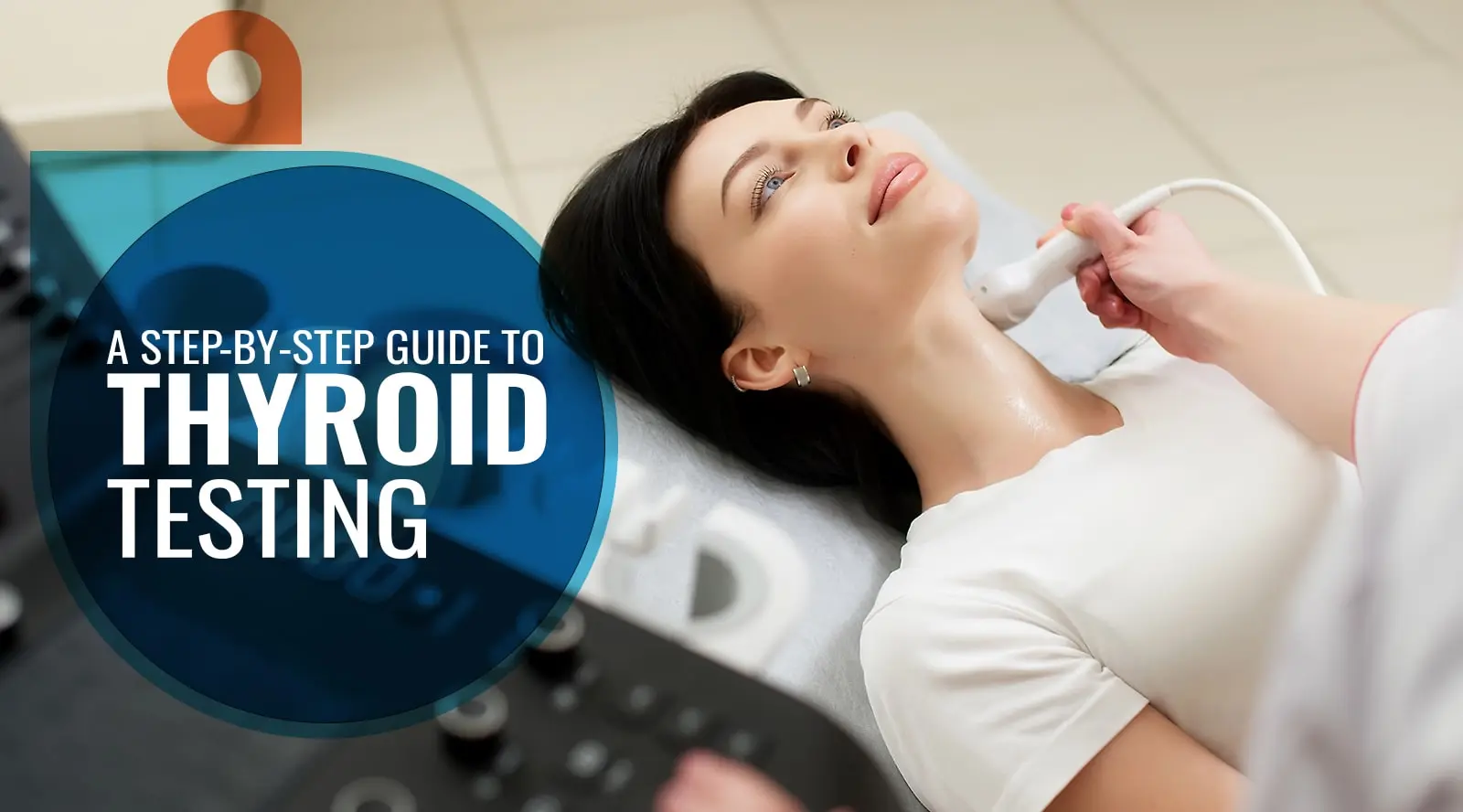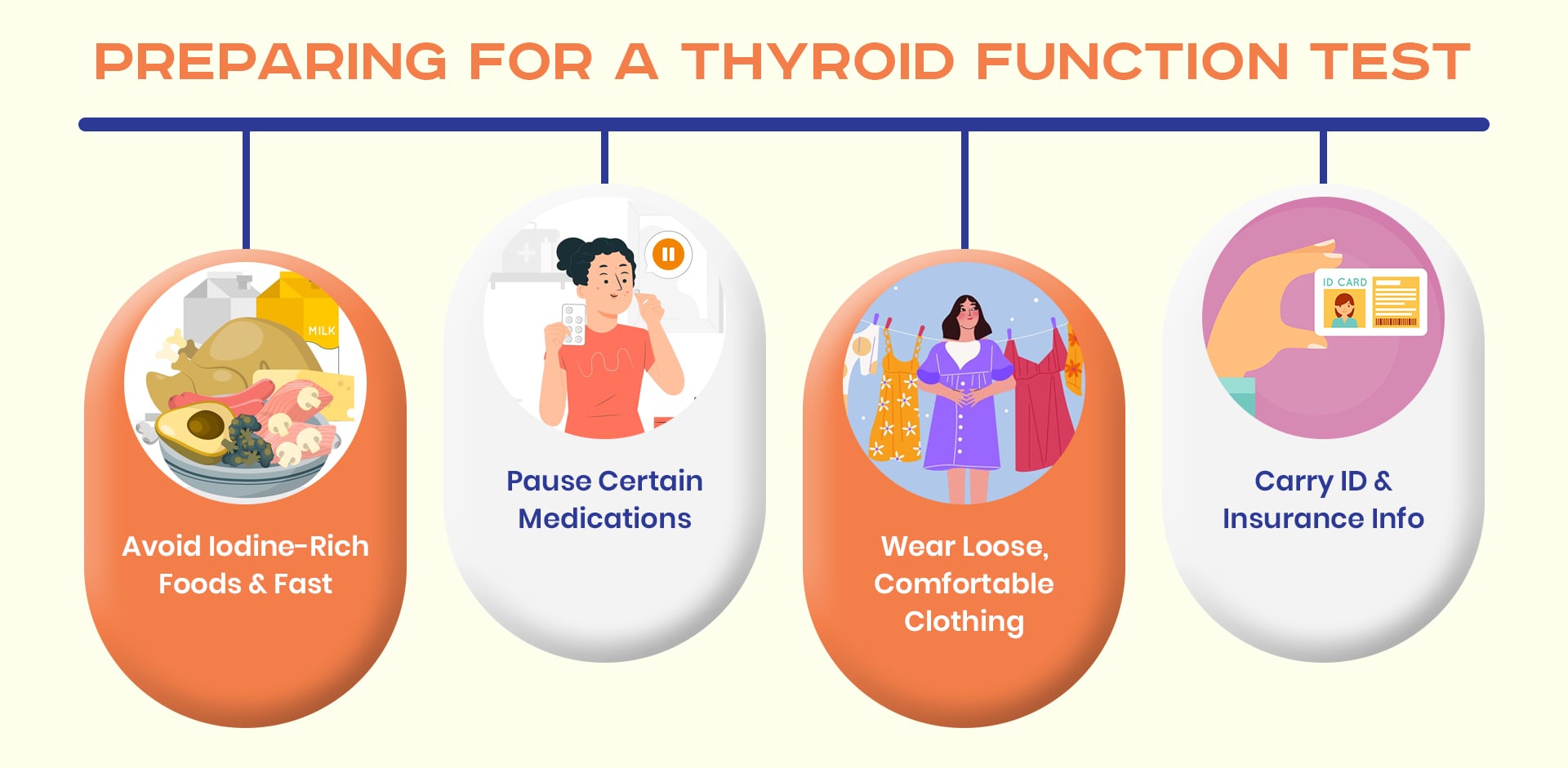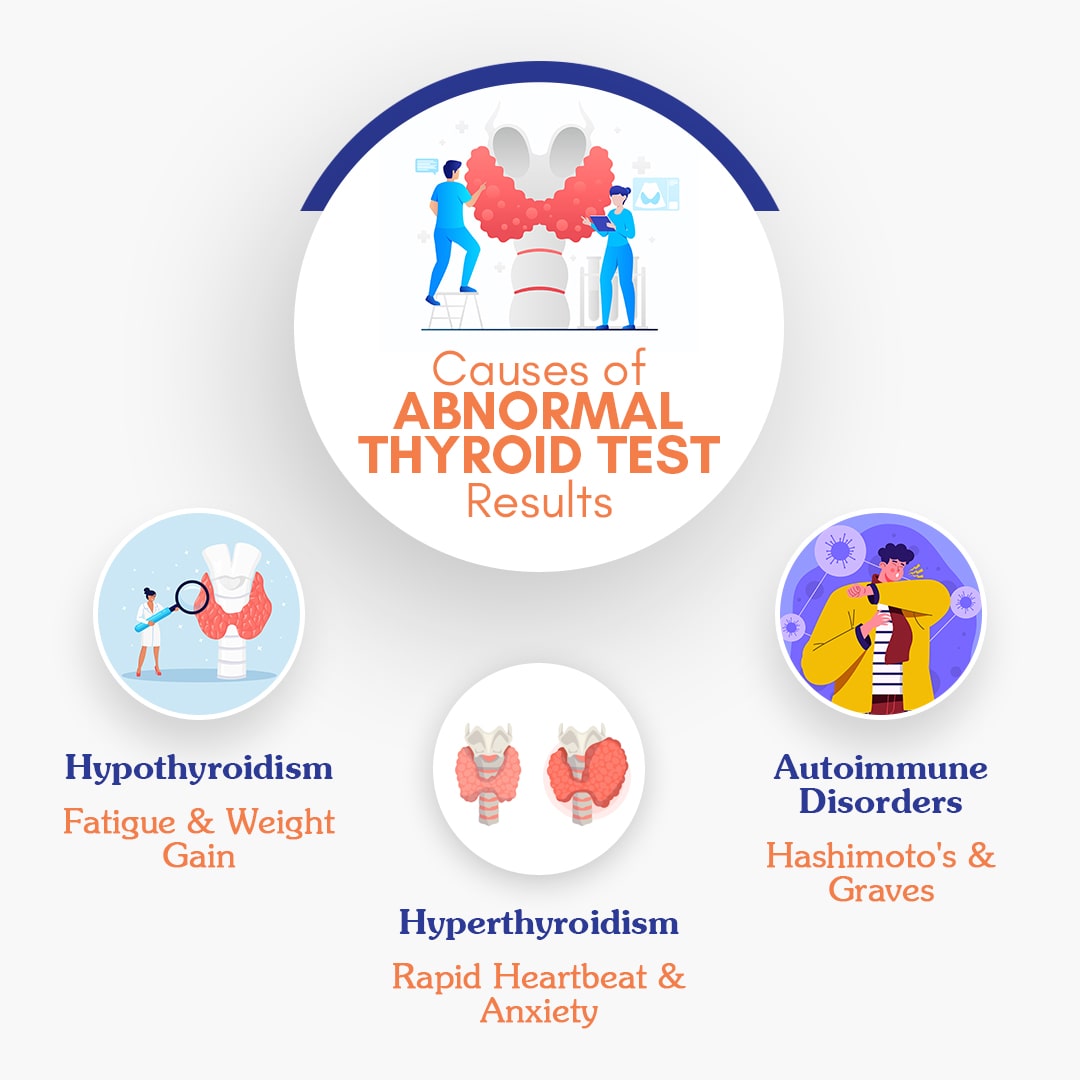-

We Are Now Open On Saturdays
-
20 Old Brompton Road, South Kensington, London SW7 3DL

We Are Now Open On Saturdays
20 Old Brompton Road, South Kensington, London SW7 3DL

Thyroid function tests are an essential tool used by healthcare professionals to assess the functioning of the thyroid gland. The thyroid gland plays a crucial role in regulating various bodily functions, including metabolism, growth, and development. Therefore, it is vital to ensure that the thyroid is functioning optimally. To obtain accurate results from a thyroid function test, proper preparation is necessary. This article will provide a comprehensive guide on how to prepare for a thyroid function test and what to expect during the procedure.
A thyroid function test is a blood test that measures the levels of hormones produced by the thyroid gland. The primary purpose of this test is to evaluate the thyroid's ability to produce and release hormones into the bloodstream. The hormones produced by the thyroid gland, namely triiodothyronine (T3) and thyroxine (T4), play a vital role in regulating metabolism, energy levels, and body temperature.
You need to perform several types of thyroid function tests, depending on the specific information. The most common tests include the thyroid stimulating hormone (TSH) test, T4 test, T3 test, and thyroid antibody test. Each of these tests provides valuable insights into different aspects of thyroid function and can help diagnose various thyroid disorders.
The thyroid gland plays a crucial role in maintaining overall health and well-being. When the thyroid gland malfunctions, it can lead to various health problems. Symptoms of thyroid dysfunction may include fatigue, weight gain or loss, hair loss, mood swings, and irregular menstrual cycles. If left untreated, thyroid problems can have serious consequences on an individual's physical and mental health.
A thyroid function test is essential in diagnosing and monitoring thyroid disorders such as hypothyroidism (underactive thyroid) or hyperthyroidism (overactive thyroid). By assessing the levels of thyroid hormones in the blood, healthcare professionals can determine if the thyroid gland is functioning optimally or if further investigation and treatment are necessary. Early detection and treatment of thyroid disorders can help prevent complications and improve overall quality of life.
Learn about the crucial warning signs of thyroid disease that you should never ignore, as shared by experts on mirror.co.uk: https://www.mirror.co.uk/news/health/thyroid-disease-red-flag-warning-30074580
Thyroid Antibody Tests calculates antibodies level into your blood that attack thyroid gland, which may be a sign of an autoimmune thyroid disease. This varies depending on the specific antibody to test.
The thyroid stimulating hormone or TSH test calculates the levels of TSH in your blood. Your pituitary gland produces TSH and stimulates the thyroid gland to produce and release T3 and T4 hormones. Elevated TSH levels may indicate an underactive thyroid, while low TSH levels may denote you are having overactive thyroid.
The T4 test measures the levels of thyroxine (T4) hormone in the blood. T4 is the primary hormone produced by the thyroid gland and is responsible for regulating metabolism. Abnormal T4 levels can indicate an imbalance in thyroid function.
The T3 test measures the levels of triiodothyronine (T3) hormone in the blood. T3 is the active form of thyroid hormone and plays a crucial role in regulating metabolism, growth, and development. Abnormal T3 levels may indicate an issue with thyroid function.
The thyroid antibody test is used to detect the presence of antibodies that attack the thyroid gland. This test helps diagnose autoimmune thyroid disorders such as Hashimoto's disease or Graves' disease.
During a thyroid function test, a healthcare professional will draw a small sample of blood from a vein in your arm using a needle. The procedure is relatively quick and straightforward, usually taking only a few minutes to complete. Some individuals may experience mild discomfort or a slight pinch when the needle is inserted, but this sensation is temporary.
After the blood sample is collected, it will be sent to a laboratory for analysis. The results of the thyroid function test will typically be available within a few days. It is important to note that the interpretation of these results should be done by a qualified healthcare professional who can assess your specific situation and provide appropriate guidance.
Proper preparation for a thyroid function test is crucial to ensure accurate results. Here are some important steps to follow before undergoing the test:
It is advisable to avoid consuming certain foods that may interfere with thyroid function test results. These include iodine-rich foods such as seaweed, seafood, and iodized salt. Additionally, fasting for a few hours before the test may be necessary, depending on your healthcare provider's instructions.
Certain medications can affect thyroid function test results. It is important to inform your healthcare provider about any medications you are taking, including over-the-counter drugs and supplements. They may advise you to temporarily discontinue certain medications before the test.
When going for a thyroid function test, wear loose-fitting and comfortable clothing that allows easy access to your arm for blood collection. Avoid wearing tight sleeves or multiple layers that may hinder the procedure.
Remember to bring any necessary documents, such as identification or insurance information, as requested by your healthcare provider. This will help streamline the check-in process and ensure a smooth experience.

The duration of a thyroid function test varies depending on various factors, including the specific tests to perform and efficiency of the healthcare facility. Generally, the procedure itself takes only a few minutes to complete. However, it is important to consider additional time for check-in, preparation, and potential waiting periods.
After the blood sample is collected, it will be sent to a laboratory for analysis. The time required for the results to be available can vary, but it typically takes a few days. Your healthcare provider will inform you about when and how you can expect to receive the test results.
After a thyroid function test, your healthcare provider will review the results and determine the next steps based on your specific situation. If the test results indicate normal thyroid function, no further action may be required. However, if the results are abnormal or inconclusive, additional testing or follow-up appointments may be necessary.
Follow-up appointments allow your healthcare provider to monitor your thyroid function over time and make any necessary adjustments to your treatment plan. It is important to attend these appointments as scheduled and communicate any changes in symptoms or concerns you may have.
Thyroid function test results are typically presented as numerical values that indicate the levels of various hormones in the blood. These values are compared to established reference ranges to determine if the thyroid function is within normal limits or if further investigation is required.
The reference ranges for thyroid function tests may vary slightly depending on the laboratory and the specific test being performed. However, in general, normal TSH levels range from 0.4 to 4.0 milli-international units per litre (mIU/L), while normal T4 levels range from 4.5 to 11.2 micrograms per deciliter (mcg/dL). Normal T3 levels typically range from 80 to 200 nanograms per deciliter (ng/dL).
It is important to note that the interpretation of thyroid function test results should be done by a qualified healthcare professional who can consider your individual circumstances and medical history.
Abnormal thyroid function test results can indicate various thyroid disorders or imbalances. It is important to consult with a healthcare professional to determine the underlying cause and appropriate treatment options.
New Study Reveals Link Between Thyroid Problems in Later Life and Increased Risk of Dementia.
Read the news here: https://www.alzheimersresearchuk.org/news/thyroid-problems-in-later-life-linked-to-increased-risk-of-dementia/
Low levels of thyroid hormones (T3 and T4) and elevated TSH levels may indicate an underactive thyroid gland, known as hypothyroidism. This condition can lead to symptoms such as fatigue, weight gain, depression, and cold intolerance.
Elevated levels of thyroid hormones (T3 and T4) and low TSH levels may denote overactive thyroid gland, known as hyperthyroidism. Symptoms of hyperthyroidism may include weight loss, rapid heartbeat, anxiety, and heat intolerance.
The presence of thyroid antibodies in the blood can indicate autoimmune thyroid disorders such as Hashimoto's disease or Graves' disease. These conditions occur when the immune system mistakenly attacks the thyroid gland.

Related Blog: 19 Signs to Identify You Have Thyroid Problems
Treatment options for thyroid problems depend on the specific diagnosis and severity of the condition. They may include necessary medication to control thyroid hormone levels, radioactive iodine therapy, or, in some cases, surgery to remove part or all of the thyroid gland.
Preparing for a thyroid function test is crucial to ensure accurate results and facilitate the diagnosis and treatment of thyroid disorders. By following the steps outlined in this guide, you can optimize the accuracy of your test results and contribute to a smooth and successful testing experience.
Thyroid function tests play a vital role in assessing the functioning of the thyroid gland, which is essential for overall health and well-being. By detecting and treating thyroid disorders early, individuals can prevent complications and improve their quality of life.
If you are experiencing symptoms of thyroid dysfunction or have concerns about your thyroid health, it is important to consult with a healthcare professional who can guide you through the necessary tests and provide appropriate treatment options. Remember, taking care of your thyroid health is an investment in your overall well-being.
Preparing for a thyroid function test can help ensure accurate results. Certain medications and supplements can affect thyroid hormone levels, so it is important to avoid them before the test.
Before a thyroid function test, you should avoid certain medications and supplements, fast for a certain amount of time, and avoid strenuous exercise. Your doctor will provide specific instructions.
You should avoid thyroid hormone medications, iodine supplements, and certain over-the-counter medications such as antacids and cough syrups. Your doctor will provide a complete list of medications and supplements to avoid.
The amount of time you need to fast before a thyroid function test can vary, but it is typically 8-12 hours. Your doctor will provide specific instructions.
Yes, you can drink water before a thyroid function test. In fact, it is essential to stay hydrated before and after the test.
During a thyroid test, the healthcare expert takes blood from the arm’s vein. The blood sample will be sent to the laboratory for further analysis.
The timing of thyroid function test results can vary, but you should typically receive them within a few days to a week. Your doctor will discuss the results with you and recommend any necessary treatment.